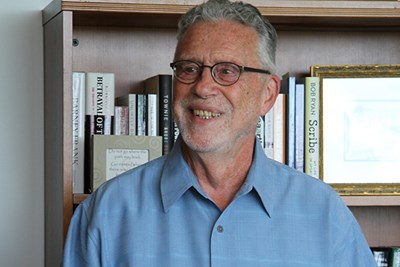Stories to be Published as a Book Next Year
 Image by K. Webster
Image by K. Webster
11/03/2021
By Jill Gambon
Everyone has a story to tell about life during COVID-19. From the frightening early days of uncertainty to the isolation of living in lockdown. From Zoom fatigue to sleepless nights. From drive-by celebrations to anxious hours waiting for COVID test results.
Some experiences were common, some were singular, but all were part of living through the historic pandemic.
UMass Lowell students, faculty and alumni have documented the accounts of Lowell and Lawrence residents in an oral history project and some of the stories will be published as a book next year.
The book, to be published by Loom Press, will feature a selection of interviews that were gathered by the Lawrence History Center and by UML students in a Sociology of Health and Health Care class.
“It’s important to capture what friends, neighbors and community leaders experienced. It’s a way of connecting us to the past and to the future, and it gives you a window into other people’s lives,” says Susan Grabski ’92, executive director of the Lawrence History Center, which began recording residents’ experiences in April 2020 for a project it called “Remote Oral History: Physically Distanced. Socially Connected."
Lawrence residents could share a quick story over the phone or sign up for a longer interview via Zoom. They could also contribute to an online community diary about their experiences.
On a similar track last September, Susan Thomson Tripathy, who at the time was an associate teaching professor in sociology (she has since retired and is now an adjunct faculty member), designed an oral history assignment that tasked students with interviewing a cross section of Lowell residents about their experiences during the pandemic.
Her class of 23 students developed a list of questions, touching on everything from whether people had been tested for COVID to what they did for stress relief. The students conducted and transcribed the interviews, which are archived at the Center for Lowell History.
“It was an amazing time to be teaching that class,” Tripathy says. “The students gained a sense of the variety of experiences people went through. Some people lost jobs, some started businesses. Some of their family members got sick. But there were some positive outcomes. People pitched in and helped each other. Parents spent more time with their children.”
The partnership with the Lawrence History Center came at the suggestion of Distinguished University Prof. Robert Forrant, who is on the history center’s board. Loom Press learned about the project and the book idea took shape.
“It’s been great to see how this came together,” Tripathy says.
Nejaray Torres ’21, who was a student in Tripathy’s class and is helping to prepare the manuscript for publication, says it was comforting to learn about how other people navigated the pandemic.
“It helped us realize that even though we experience things differently, we are not alone,” says Torres, who majored in English with a concentration in journalism and professional writing.
The project is also providing hands-on experience for English major Christopher Medeiros, who is interning with the Lawrence History Center for the fall semester. Medeiros, a junior whose concentration is also journalism and professional writing, is transcribing the interviews to get them ready for print.
“It’s been a great learning opportunity,” he says. “It feels good to be part of this collaboration. And transcribing the interviews, it makes you reflect on everything.”
Tripathy, whose mother was in an assisted living facility during the pandemic, says reading the interviews helped her put her own experience in perspective.
“It was fascinating to read about students who worked in nursing facilities and provided services to patients,” she said. “It gave me a more holistic view of what they went through, to see how much anxiety the health care workers dealt with and how much they cared about keeping the residents safe.”
Grabski said the interviews reflect some of the broader trends that developed during the pandemic, including racial discrimination and hostilities faced by Asian Americans after the virus emerged in China.
“It’s important to get a contemporaneous record” of the pandemic, says Paul Marion ’76, ’05, the founder and editor of Loom Press. “With interviews you get a layered view. The transcriptions are the voice of the people.”
Marion sees potential in the book being used as a text for college or high school classes. A previous Loom Press title, “The Big Move” by Forrant and history Prof. Christoph Strobel, was an oral history of Lowell immigrants. Published in 2011, the book was assigned reading for college courses and became the best-selling title that Loom Press has published, Marion says.
If all goes according to schedule, the pandemic oral history book is expected to be released next spring. Political Science Emeritus Professor John Wooding is serving as associate publisher on the project for Loom Press.




